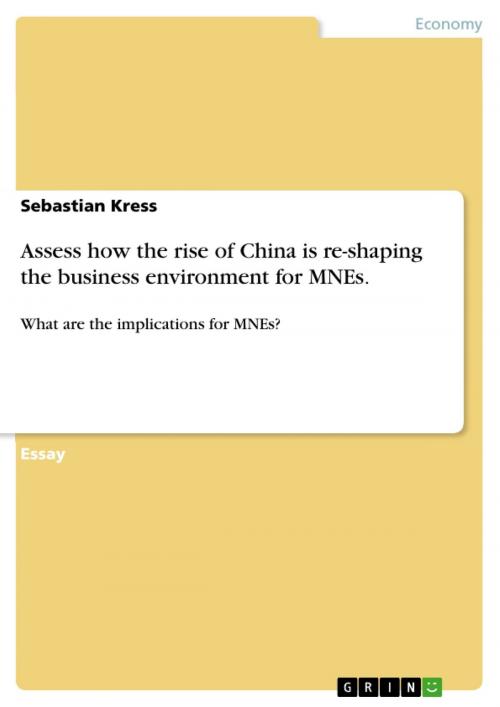Assess how the rise of China is re-shaping the business environment for MNEs.
What are the implications for MNEs?
Business & Finance, Economics, International| Author: | Sebastian Kress | ISBN: | 9783656048299 |
| Publisher: | GRIN Verlag | Publication: | November 7, 2011 |
| Imprint: | GRIN Verlag | Language: | English |
| Author: | Sebastian Kress |
| ISBN: | 9783656048299 |
| Publisher: | GRIN Verlag |
| Publication: | November 7, 2011 |
| Imprint: | GRIN Verlag |
| Language: | English |
Essay from the year 2011 in the subject Economics - International Economic Relations, grade: 2, Heriot-Watt University Edinburgh, language: English, abstract: The aim of this paper is to outline how the rise of China is re-shaping the business environment for multi-national enterprises (MNEs) and how this is affecting their businesses. The aggrandisement of China to become the second-largest economy in the world occurred already in 2010 and this year it has been estimated that the People's Republic of China will outrun the United States of America as the biggest manufacturer (Hout and Ghemawat, 2010, p.95). Due to their economic power, the Chinese government is also gaining more political power, which shows the willingness of China to contribute to the Eurozone's bailout fund (Anderlini, 2011a). Moreover, this shows the significance China has as an economic region for the MNEs. Although the initial approach was primarily to get access to low-wages labour in order to economise the manufacturer cost, this has recently experienced an enormous turnaround. Many enterprises no longer just seek the advantages of low-labour cost in China, but to a greater extent MNEs emphasise the 'purchasing power [which] continues to increase [and so] their population is becoming important consumer markets as well' (Cavusgil, Ghauri and Agarwal, 2002, p.2). At the same time China has been undergoing a movement towards a new stage of development. A shifting from a successful low- and middle-tech manufacturing economy to a sophisticated high-tech one has been seen and, as Hout and Ghemawat put it, this has been achieved 'by cajoling, co-opting and often coercing Western and Japanese businesses' (2010, p.96). Even though China seems to offer a great opportunity for MNEs to produce and to sell their products, still the MNEs are facing huge challenges due to the provisions of national law.
Essay from the year 2011 in the subject Economics - International Economic Relations, grade: 2, Heriot-Watt University Edinburgh, language: English, abstract: The aim of this paper is to outline how the rise of China is re-shaping the business environment for multi-national enterprises (MNEs) and how this is affecting their businesses. The aggrandisement of China to become the second-largest economy in the world occurred already in 2010 and this year it has been estimated that the People's Republic of China will outrun the United States of America as the biggest manufacturer (Hout and Ghemawat, 2010, p.95). Due to their economic power, the Chinese government is also gaining more political power, which shows the willingness of China to contribute to the Eurozone's bailout fund (Anderlini, 2011a). Moreover, this shows the significance China has as an economic region for the MNEs. Although the initial approach was primarily to get access to low-wages labour in order to economise the manufacturer cost, this has recently experienced an enormous turnaround. Many enterprises no longer just seek the advantages of low-labour cost in China, but to a greater extent MNEs emphasise the 'purchasing power [which] continues to increase [and so] their population is becoming important consumer markets as well' (Cavusgil, Ghauri and Agarwal, 2002, p.2). At the same time China has been undergoing a movement towards a new stage of development. A shifting from a successful low- and middle-tech manufacturing economy to a sophisticated high-tech one has been seen and, as Hout and Ghemawat put it, this has been achieved 'by cajoling, co-opting and often coercing Western and Japanese businesses' (2010, p.96). Even though China seems to offer a great opportunity for MNEs to produce and to sell their products, still the MNEs are facing huge challenges due to the provisions of national law.















